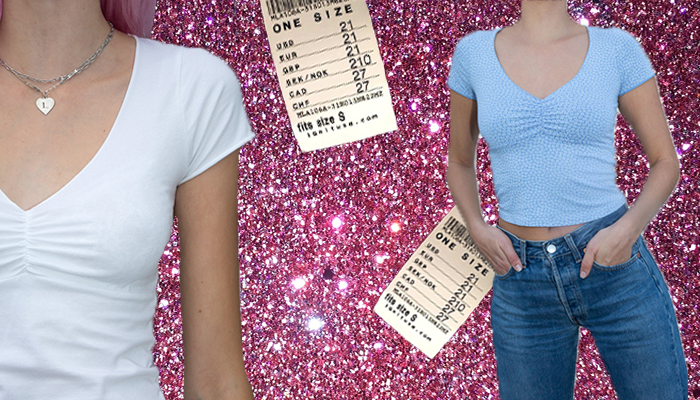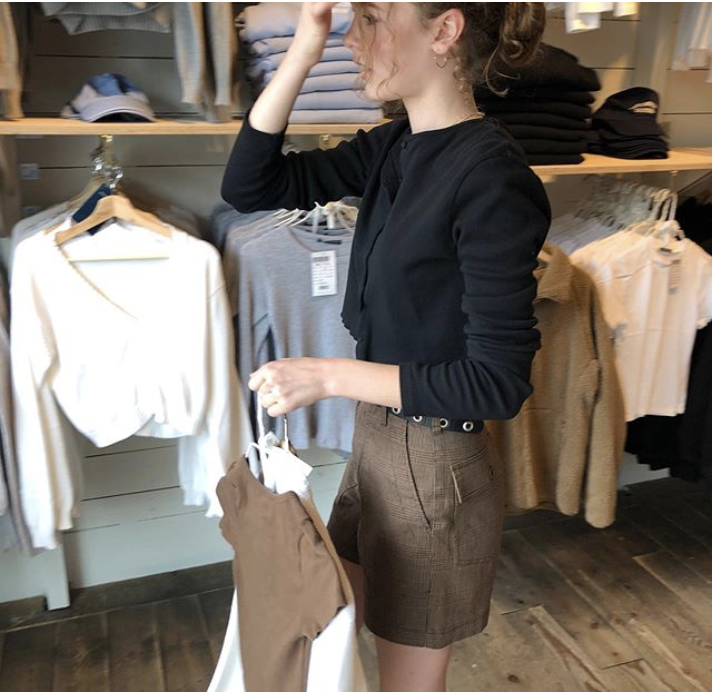Brandy Melville Putting the Guilty in Guilty Pleasure Shopping: A Retail Success Story and an Ethics Horror Show
Graphic by Rachel Price. Image via Brandy Melville.
The appeal of a brand like Brandy Melville for young girls is not difficult to understand. They offer unarguably on-trend clothing for a fraction of the price of many other retailers with most pieces not costing more than $40 dollars. If you can fit into the clothes, that is. The fashion retailer is almost as well known for their strict, one size fits all, which actually runs a size 0-2, standard as they are for their ever popular babydoll tees.
Every few months, there is some sort of hub-bub regarding the brand’s incredibly narrow, as in non-existent, size range. Articles have appeared in The Odyssey, and a Huffington Post article in 2014 called out Brandy Melville’s labeling of their aesthetic as “young, white, skinny, and long-legged.” Five years later, conversations about diversity of race, size, gender identity, and sexuality are becoming more common within fashion, yet the girls featured on Brandy Melville’s’ Instagram are still the same young, skinny, long-legged, white girls.
Image via Brandy Melville
While Brandy Melville’s complete lack of decorum in regard to a size range is a concerning and demenable problem, the brand’s issues run deeper than this. For starters, the brand is privately owned, and those owners are very tight-lipped when it comes to business practice. There is relatively no information on the brand’s production besides the clothing supposedly being made in Italy with some products being outsourced to China. This means that exactly how they manage to keep their price point so low remains a mystery that could have disturbing truth lurking behind it. Besides this, there are also countless reports of unethical hiring and workplace practices. Glassdoor, a review site for companies, features hundreds of reviews from former employees claiming favoritism (even wage-based favoritism) based on appearance. One review states, “Raises are based purely on favoritism and looks. Two girls could have the same exact job and the prettier one could get paid[sic] $4 more”. There are also reports of being fired based on weight gain. The complaints lodged against the brand go on, to Brandy Melville's white, thin aesthetic, another review states, “the company owners are hugely discriminatory toward people of colour and even go as far as to say to only look for white/western girls to work”. The same review outlines how managers are tasked to take photos of employee’s outfits for the brand to replicate and mass produce.
This practice of hiring thin, young, and white girls carries over into their marketing. The brand’s Instagram does not feature professional models, but rather normal girls, including employees and customers. This technique is used to enhance the very thing that Brandy Melville is trying to accomplish with all of these choices. An extreme sense of exclusivity. It is the same tactic that the fashion industry has used for years. Hire models that convey a limiting, unrealistic sense of beauty and market that specific standard of beauty. Brandy Melville flips this by uses non-models. Noting that their main customers are young girls, now suddenly that unreachable beauty standard isn’t being created around a professional model, but your peers. Suddenly, that pressure to fit into the clothes and to look like these girls is magnified.
Image via Brandy Melville
Yet, despite the continual airing of Brandy Melville’s very dirty laundry, the brand remains revenue generating while many other teen-centered retailers go under. According to the website Fashion Law, the brand brought in somewhere around 300 million in 2018. They utilize a technique that’s been employed by retailers over the years such as American Apparel and Abercrombie. They’ve cultivated a demographic, and everything from their store employees to their marketing congratulates you for fitting in it and shames you for being outside of it. What it would take for “Brandy Girls” to discontinue support for the brand for its plethora of unethical practices remains unknown. For now, Brandy Melville remains a guilty pleasure of those who can fit into the clothes and purchase them while being aware of the brand’s ethics. As long as consumers remain loyal to the brand, no change will come to their discriminatory, unethical practices.



